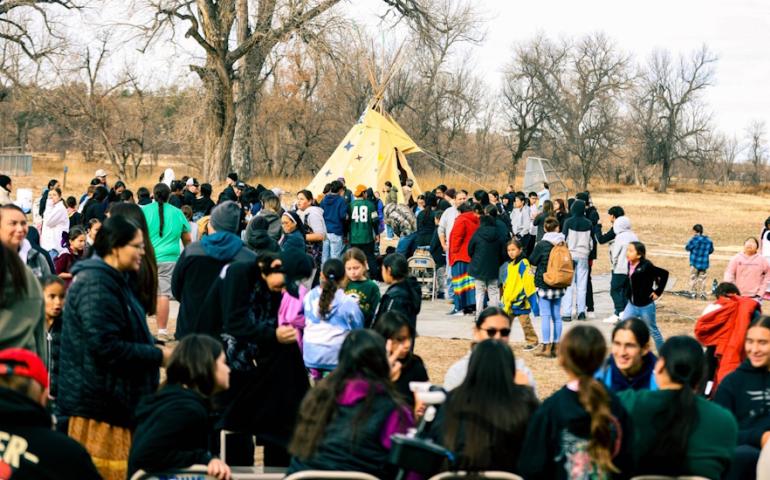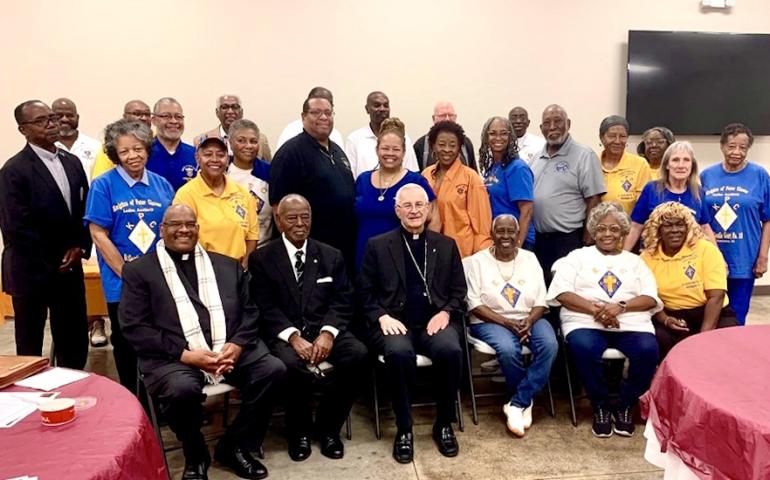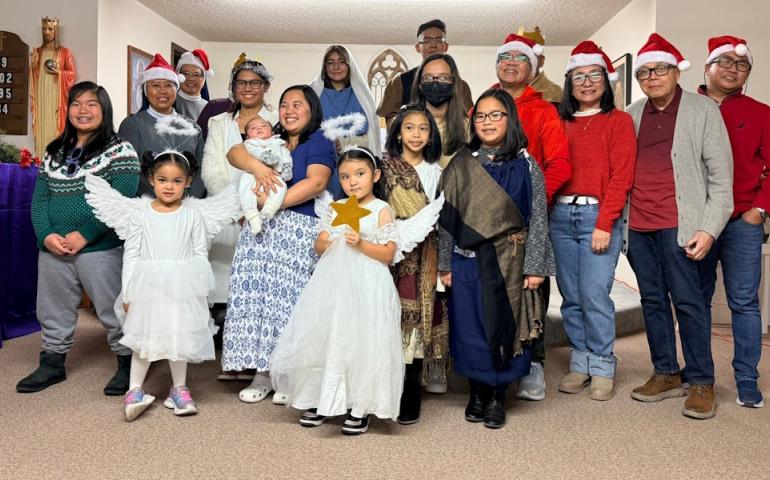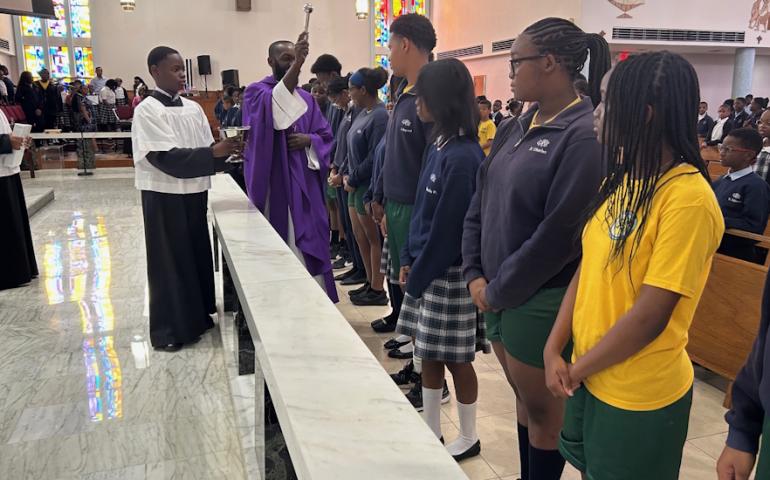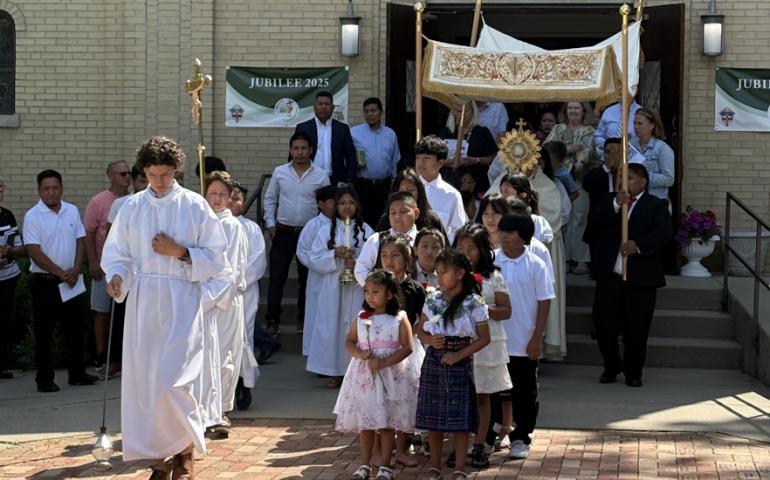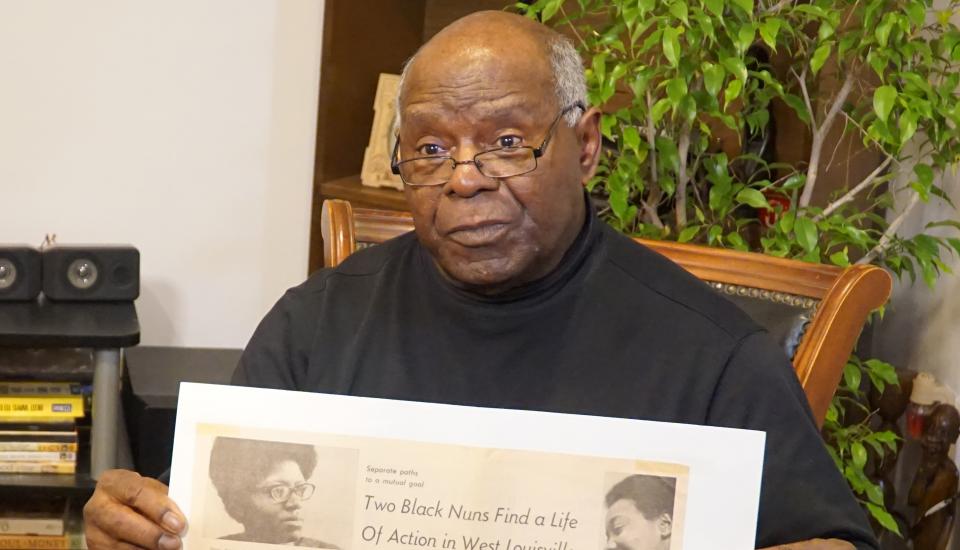
Archdiocese of Louisvlle
More than 50 years ago, the Civil Rights era and the changes of Vatican II combined in West Louisville to generate new energy in black Catholic life. Charles David, a long-time parishioner of St. Martin de Porres Church experienced it first-hand and called it a “freeing of the Spirit.” “It was a great time in the church,” he said. “It gave African Americans a sense of belonging in the church.”
David shared these experiences and others during an interview last month for “Honoring Our Gifts,” a series of stories and oral history videos produced by The Record and Father Patrick Delahanty’s River Birch Productions. The series intends to highlight not just the injustices faced by black Catholics, but also the perseverance and gifts they have shared in the Catholic Church. During the Civil Rights era and with the changes of Vatican II, Gospel music became part of black Catholic liturgies, David noted. The way was paved for new statuary, stained glass and other artistic expressions of African American culture and history. New and authentically African American styles of worship invigorated the community, leading to new ways of living the Gospel, said David.
Black sisters, including the late Sister of Charity of Nazareth Pat Haley, came to West Louisville and the first African American priests in Kentucky began assignments in black churches here.
Black sisters, black clergy and black lay people “began coming together to talk about sustaining black people in the church and keep them in the church,” he said, noting that about 20 Catholics from the Archdiocese of Louisville attended the first Black Catholic Convention in Detroit. In 1972, hundreds of people attended the National Black Sisters Congress in Louisville at what was then Spalding College, now Spalding University.
The sense of shared experience and belonging these events imparted was important, David said, noting that black Catholics generally felt alienated from the Catholic Church, which had relegated blacks to the back pews of churches, just as they were on buses and everywhere else in life. They also felt alienated from other black Christians, who tended to be Protestant, he noted.
“We really were a minority within a minority,” he said.
The changes of Vatican II, though, made evangelization easier. “When we brought friends and relatives to church who were not Catholic, they used to say, ‘Well, what’s that?’ After Vatican II, they could understand what was going on.”
Today David and his wife of 54 years, Beverly, are members of St. Martin de Porres and St. Louis Bertrand churches. But more than 80 years ago, David was born into a family with nine children that belonged to the now-closed St. Peter Claver Church in Smoketown, a predominantly black neighborhood near downtown Louisville.
St. Peter Claver was an African American parish with a school. They were led by Franciscan Friars based at St. Boniface Church and Ursuline Sisters, who at the time lived on Chestnut Street near St. Martin of Tours Church just east of downtown.
“It was a very good experience,” he said of his childhood at St. Peter Claver. “It was like family. We were not aware of what our economic situation was — we were in like a village. “Many of the families originated out of what today is the Kentucky Holy Land,” he said, noting that his mother hailed from the area of St. Mary, Ky., one of the first cradles of Catholicism in the commonwealth. Henrietta David was a Haydon and her ancestors came to Kentucky from Maryland, likely as slaves to a Catholic family. “A lot of the kids in the school had the same story,” he said. David and many of the other children were in the parish’s Drum and Bugle Corps and took part major parades around the city. “We were pretty well known for that,” he said.
St. Peter had some other noteworthy members. Among them was the late Father Boniface Hardin, a Benedictine of St. Meinrad Archabbey who was regarded as a national leader of black Catholics. He was a social activist and founding president of Martin University in Indianapolis. He died in 2012.
David, like many African American children at the time, attended Catholic Colored High, which closed in 1958. He graduated just two years before it closed. To get there, he used to walk past St. Xavier High School.
David is glad to say that his own sons attended St. Xavier and Bishop David High School (and later Holy Cross High School) while his daughter attended Presentation Academy. After high school, David went on to Bellarmine University, which provided a scholarship and work study opportunities. He also served a six-month tour in Vietnam during the war there. As an adult, David worked for the U.S. Postal Service for a short time before being hired by GE. He and his wife raised two sons and a daughter who are all professionals.
They worshipped on the site of St. Martin de Porres for most of their married life. The parish was previously home to Holy Cross Church, which closed in 1990 along with two other West End Parishes to form St. Martin de Porres, named for a 19th century Dominican lay brother who was the son of a free slave.
Catholic life at St. Martin de Porres continued to thrive after the initial influx of energy from the Civil Rights movement and Vatican II. The parish by then had come into its own way of living the Gospel, unique to its culture and heritage, said David.
Catholic Charities by then was resettling refugees, particularly from Vietnam. Parishioners, including the David family, became mentors to refugees, helping them find their own place in Louisville. The parish later helped resettle Catholic families from Haiti, who have become active members of the parish community, David noted.
As the parish discerned how to help these families, David said, “We talked about the fact that even the people who are in need come with gifts.” “We were glad to be helping people who were in worse shape than we were,” he noted. “We felt we were doing Jesus’ work; we were his hands.” More recently the parish has helped welcome families from Congo and Sudan. “It’s been a real blessing to the church,” David added.
David said he and his wife Beverly raised their children amid all of these blessings and taught them, “Put God first, involve yourself, use y our skills and talents.” “They all have a sense of whose children they are: not only our children, but God’s children. We are proud of that.

